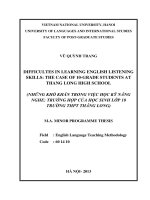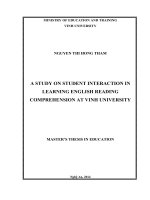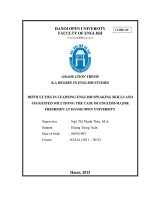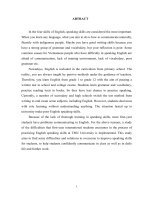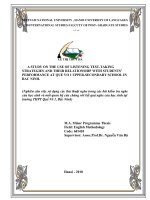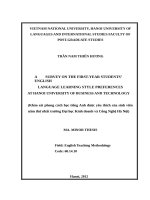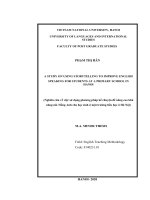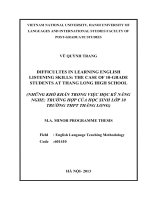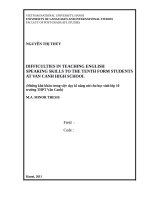A study on the difficulties in learning english speaking skills faced by the first year international students at TMU and possible solutions
Bạn đang xem bản rút gọn của tài liệu. Xem và tải ngay bản đầy đủ của tài liệu tại đây (546.61 KB, 60 trang )
ABTRACT
In the four skills of English, speaking skills are considered the most important.
When you learn any language, what you aim to do is how to communicate naturally,
fluently with indigenous people. Maybe you have good writing skills because you
have a strong grasp of grammar and vocabulary, but your reflection is poor. Some
common causes for Vietnamese people who have difficulty in speaking English are
afraid of communication, lack of training environment, lack of vocabulary, poor
grammar etc.
Nowadays, English is included in the curriculum from primary school. The
reality, you are always taught by passive methods under the guidance of teachers.
Therefore, you learn English from grade 1 to grade 12 with the aim of passing a
written test in school and college exams. Students learn grammar and vocabulary,
practice reading texts in books. So they have less chance to practice speaking.
Currently, a number of secondary and high schools switch the test method from
writing to oral exam some subjects, including English. However, students deal most
with rote learning without understanding anything. The situation lasted up to
university make poor English speaking skills.
Because of the lack of thorough training in speaking skills, most first-year
students have problems communicating in English. For the above reasons, a study
of the difficulties that first-year international students encounter in the process of
practicing English speaking skills at TMU University is implemented. This study
aims to find some difficulties and solutions to overcome to improve speaking skills
for students, to help students confidently communicate in class as well as in daily
life and further work.
ii1
ACKNOWLEDGEMENTS
In the process of completing this thesis, I have received a lot of help from my
supervisor, teachers of English Faculty – Thuongmai University, first-year
international student.
Firstly, I would like to thank Mrs. Nguyen Thi Bich Ngoc, who guided me to
complete this graduation thesis. Thanks to the dedicated guidance, careful
instruction, I can complete the graduation thesis. Her comments and suggestions
made me realize what was missing in my research. The words of encouragement
and facilitating me to be able to complete this thesis.
Secondly, I would like to thank the teachers of the English department who
helped me to complete my studies in class so that I can conduct this thesis. At the
same time, I also thank the freshmen of the international university of trade
university for helping me in surveying to find difficulties in learning English
speaking skills.
Last but not least, I would like to sincerely thank my family for always
supporting and strengthening my strength and efforts and love for me to follow.
Thank you, friends, who always stand side by side, support and support me in my
study and life.
ii2
TABLE OF CONTENTS
ii3
LIST OF ABBREVIATIONS
No
1
Abbreviations
TMU
2
EFL
English meaning
Vietnamese meaning
Thuongmai University
Đại học Thương Mại
English
as
a
foreign
Tiếng Anh như ngoại ngữ
language
ii4
LIST OF FIGURES AND CHARTS
ii5
CHAPTER 1: OVERVIEW OF THE SUTYDY
1.1. Rationale
English is becoming more and more important in today's life. English is a
global language with more than 53 countries used and the official language of the
EU. For Vietnam, a country in the era of global development and integration,
English has become increasingly essential than ever. English exists in all different
professions such as business, technology, medicine, import, and export etc. English
decides 50% success in your work, especially foreign companies, you will need a
common language to exchange. Employers will hire a candidate who has excellent
English skills instead of an English proficient candidate, which will determine your
future and future work.
Moreover, it's great when you're good at all 4 English skills: listening.
speaking, reading, writing. This will make you stand out in your work and life.
Opportunity to come to you more, you have the opportunity to access more sources
of knowledge. 55% of websites in the world write in English, 95% of the articles
are collected at the US Science Information Institute written in English. Many great
works of the world such as the works of George Orwell or Jane Eyre, Emily Bronte
will give you the feeling that translation texts do not bring.
Today English is used in commerce more and more widely. As TMU, it is even
an international training department, a faculty affiliated with many major
universities abroad. The use of English by international education students is not as
good as expected. Communication skills are seen as essential skills when you learn
any language, which is used daily in your life, study and future work.
The most difficult is for freshmen when they are not familiar with the
university curriculum as well as the teaching method. Mostly in high school,
students have almost no chance to practice speaking English, but only focus on
grammar and vocabulary for the final exam. The reason why make students afraid
to speak, afraid to say wrong or fewer reflexes etc. All of these factors make it
difficult for students to speak English when they go to college. This makes it
ii6
difficult for students to learn in the classroom, especially when there are subjects to
speak English.
Therefore, in this study, I will study “ A study on the difficulties in learning
English speaking skills faced by the first-year international students at TMU and
possible solutions” to improve students' speaking skills.
1.2. Previous studies
According to my research, there are a few research topics about difficulties in
practicing English speaking. Some topics refer to non-English major students. I
have consulted some studies in Vietnam in particular and in the world in general on
this research topic, for example:
In Ur, P. (1996) research studies, he pointed out that there are four factors that
make it difficult to practice speaking: students often worry about mistakes, fear of
being scolded, shy; students themselves have no effort; uneven participation in a
class, some participants are enthusiastic while the rest do not say anything; they are
afraid to speak another language, they tend to like to speak their mother tongue
because it is easier.
Lukitasari (2003) research has shown that learners do not improve their
speaking skills because they do not learn three important elements in speaking,
namely vocabulary, grammar and phonics.
According to the study of Lawtie (2004), the difficulties of speaking are
affected by emotional state. They are dominated by emotions like unconfident, shy,
anxious, nervous. If they do not believe in themselves, this will become a big
problem for them. Therefore, emotional factors become one of the important factors
to consider when communicating with people who have difficulty speaking.
In addition, Rababa’h (2005) he indicates that this difficulty comes from
themselves, teaching strategies, teaching programs and living environment. In other
words, they have no motivation to learn English or they have not felt that this is an
important thing.
Hinkel (2005) stated that problems that occur when communication is possible
because they do not understand the meaning of the word, do not know how to use it
ii7
and cannot express their meaning. This prevents the communication process from
becoming successful.
According to Yunita (2014), she said that some of the problems students face
when speaking English are pronunciation, grammar, vocabulary, motivation,
anxiety and embarrassment. It is these factors that hinder students' English speaking
process. The author studied a number of subjects who encountered this problem in
learning to participate in difficult to learn English and she realized that these
students could not speak English fluently.
According to the study of Nauli (2014), there are three factors that influence
the process of learning English. It's cultural difficulties (including social acceptance
and English status), English difficulties (including elements problem and personal
problem) and communication problems (self-confidence and speaking opponent).
These objective and subjective factors were studied by him at the national
university in Jambi.
In Mustafa Mubarak Pathan (2014) research studies about ” An Overview of
Major Difficulties Faced by the Libyan EFL Learners in Speaking Skill”, He
pointed out several causes of difficulty in practicing speaking skills, such as:
pronunciation, the use of adjective, the use of prepositions , the use of idioms,
grammatical errors , semantic errors, other problems ( lack of vocabulary, fear /
embarrassment while communicating, lack of interest and motivation, lack of
practice,lack of environment for practice, …), influenced by mother tongue. He
gave the reasons for the above reasons: “Their failure to recognize this is primarily
because of the failure on the part of their teachers to make them understand this
fact at the very early stage of their learning. And this failure on the part of the
teachers is because of the facts that most of the EFL school teachers in Libya are
neither trained properly for this reason nor are their skills upgraded.”
In Samira Al Hosni (2014), she lists three main difficulties when speaking
English, they are linguistic difficulties (students find it difficult when they lack
vocabulary, some students have said: “We want to speak, but we don’t know the
word” or “We do not know how to say it”. Although the teacher has been teaching
grammar for a long time, students still can’t say short sentences), mother tongue
ii8
use, and inhibition (students are scared of making mistakes in front of the crowd,
which is why they don't say in class. They said "They will laugh at us if we make
mistakes").
Although there were many people working on speaking skills, the truth is that
the number of students who speak English confidently is still small. It is because of
the above difficulties that are repeated but not completely ended so I chose to study
this topic.
1.3. Aims of the study
This study was conducted to understand why the freshman students of TMU's
International Training Faculty had difficulty learning English speaking skills. After
identify difficulties, I will give some solutions that correspond to those difficulties
to improve students' speaking skills.
Based on previous research, I hope this research will help first-year
international students at TMU improve their difficulties in practicing speaking
skills. Since then speaking skills of students can be improved to serve for classroom
learning as well as in life.
1.4. Research subjects
This study was carried out with 100 students in the Tourism and Service
Administration major of International Training Faculty TMU. Specialization
Tourism and Service Administration has a total of more than 200 students, but due
to time constraints, I focused on the difficulties that 100 students encounter when
learning to speak English. Students are exposed to many different ways of teaching
in different schools, so each person's ability is different. Therefore, the results
obtained from the study will be the most accurate and realistic results.
1.5. Scope of the study
The International Training Faculty at TMU has many different majors.
However, due to limited time and to get the most accurate results, I choose to
narrow down the scope. This is specialized Tourism and Service Administration.
Currently, this major has more than 200 students. I will survey 100 students in this
field.
ii9
For the purpose of finding out the difficulties that students encounter when
learning to speak English, research will be done to find the purpose above. I hope
these studies can help them identify difficulties and implement solutions to
improve.
1.6. Research methodology
According to C.R.Kothari, research method is defined that the methodology
refers to a systematic method that includes problem making, hypothesis formation,
data collection, analysis and making conclusions to a certain generalization for a
number of the theory given. In the methodology, there are qualitative and
quantitative methods. However, with the study based on the number of such
students, I decided to choose a qualitative method to do this research. C.R.Kothri
wrote: "Qualitative research, on the other hand, is concerned with qualitative
phenomenon, i.e., phenomena related to or involving quality or kind". In this
method, we are interested in the reason and thinking of the object studied.
Qualitative methods are implemented in many different ways such as
questionnaires, interviews, observations etc. In order to bring the most objective
results, I have used two methods which are questionnaires and interview. With the
combination of these two methods, I hope to bring together results in many aspects.
1.6.1. Instruments
1.6.1.1. Questionnaires
The study was conducted at TMU. This research is based on questionnaires.
This is a great support tool for collecting qualitative information, which saves time
to collect and analyze data. In this method, the questionnaire will be given to
students with pre-existing questions and answers. Students will read and answer
questions according to the form. Using this questionnaire to find out the level of
some difficulties in speaking English. Also, that uses qualitative methods to
investigate the frequency and abilities of students. With this method, we will have
an accurate view of students' thoughts and opinions.
The questionnaire was designed for 100 first-year international students at
TMU, majoring in Tourism and Service Administration. The goal of the
questionnaire is to understand the difficulties, causes and solutions to improve
ii10
students' speaking skills. The questionnaire consists of 10 sentences. Questions
were designed from general questions to specific questions in order to determine
students' English proficiency. The questionnaire will be written in Vietnamese and
instructions in Vietnamese so that students can understand almost exactly what they
are answering, avoiding confusion. In order to ensure trust and security, before I
distributed the questionnaire, I pledged that the questionnaire was only intended for
research, not for any other purpose
1.6.1.2. Interview
According to C.R.Kothri, the interview method collected data related to an
oral answer. The interview requires the interviewer to ask questions regarding the
research problem in the form available to collect information. The method is
suitable for in-depth investigations. Methods of collecting information through
interviews are often done in a structured manner. Ask questions according to the
available form and write down the answers. This interview aims to increase the
practicality of the questionnaire above. Interviewees give answers according to their
own views. From there give an overview of the results obtained.
For a more objective and realistic result, I used an interview method. This
method is aimed at students who can answer according to their own opinions.
Interviews provide a deeper and more detailed answer to the difficulties students
face. The interview consists of 2 questions about the difficulties students face and
the solutions that students can overcome. Interview in the Vietnamese language
helps students have a clearer and more specific understanding, avoiding confusion.
Combine the interview method with the questionnaire to bring the most objective
and authentic results to the research.
1.6.2. Data collection procedures
Study using the questionnaire and interview for first-year international
students at TMU to collect the difficulties that students encounter in the process of
learning English speaking skills. Questionnaires and interview are written in
English and Vietnamese. The Vietnamese questionnaire to survey students to
provide a clear understanding of the difficulties that the research is directed at.
ii11
English questionnaire for collection of collected results and summarized for
analysis. Steps to collect data are conducted as follows:
Step1: Design questionnaires based on difficult theories in practicing speaking
skills according to the theory in chapter 2. The content of the questionnaire consists
of 10 sentences. In addition, the interview consists of 2 sentences. Questionnaires
written in both English and Vietnamese help students understand exactly what they
are doing.
Step2: Distribute questionnaires to 100 students and interview 50 students
specialized in Tourism and Service Administration Tour of International Training
Faculty. Survey period between second semester 2018-2019.
Step3: Collect the survey results from students, prepare for data analysis step.
1.6.3. Data analysis methods
The interviews were conducted with 100 first-year international students at
TM University. All questionnaires made in Vietnamese are then translated into
English. Each questionnaire focuses on the difficulties faced by first-year students
English speaking skills in the English language learning process. The popular
statistics program computer application is used to analyze data. Although following
a predetermined structure, interviewers can ask probing questions to get a better
understanding of the issues being discussed (Gillham, 2005).
Based on the results obtained from the survey questionnaire, conducting data
analysis focused on the difficulties set out in the theory of chapter 2. From the
results obtained in tables and graphs for comparing the rate of difficulties students
face. Finally, the study provides an objective review of the analytical results.
1.7. Organization of the study
The study consists of five parts as follows:
Chapter 1: Overview of the study consists of rationale, previous studies, aims
of the study, research subjects, scope of the study, research methodology and
organization of the study.
Chapter 2: Literature review provides an overview of theory such as the
definition of speaking, factors affecting English speaking ability and difficulties in
first-year international student English speaking skills.
ii12
Chapter 3: Research findings give discussions about research results, analyze
data and results through data collected through survey questionnaires.
Chapter 4: Recommendations and suggestions provide some measures to
improve students' English speaking skills.
Conclusion summarizes the main ideas of the study, outlines the limitations of
the study and gives some suggestions for further research.
ii13
CHAPTER 2: LITERATURE REVIEW
2.1. Definition of speaking skills
Speaking skills are considered the most important skills when starting to learn
a foreign language. Speaking is a set of factors such as grammar, vocabulary,
semantics, pronunciation. The first thing when you learn another language is to
learn to speak, learn to speak through communication with people around you. After
that, you will learn about other skills such as writing and reading.
Speaking shows the interaction between the speaker and the listener. Through
the way you speak, the opposite person will know what you are like? How you
build speech, how to reason, guide or how to receive and process information.
Speaking is the use of maximum language to express meaning.
There are many definition of speaking. Hornby (1990, p.1227) defines
“Speaking is make use of words in an ordinary voice”. Widdowson (1984, p58)
adds that “Communication through speaking is performed face to face interaction
and occurs as part of a dialogue or other form of verbal exchange.”
According to Chaney (1998): “Speaking is the process of making and sharing
meaning by using verbal and non-verbal symbols in different contexts”. Brown
(1994) and Burns and Joyce (1997) defined speaking as the exchange process to
create meaningful sentences including production, reception and processing of
information. Bygate (1987) defined speaking as the reception of information from
the hearing to produce reactions from the listener. It is regarded as combining
sounds to create form meaningful sentences.
From the above definitions, we can give a general definition of speaking.
Speaking is a form of expressing information using sentences. Saying is using
language depending on the intention of the speaker, a means of communicating
between objects to express their thoughts, share ideas, feelings and intentions to
interact with each other.
In English, speaking skills are more important. Moreover, in the era of
economic integration and distribution like now, it is said to be a necessary skill in
this era. Government organizations and the Ministry of Education should recruit
14
good English speakers. Companies and businesses want employees to speak English
well to be able to reach many important foreign customers. Students who speak
good English help them have a better chance of studying, finding jobs and
advancing.
2.2. The importance of speaking skills
People spend more time speaking than other skills. Speaking is one of the
necessary abilities in life. Speaking English is not an easy task because there are many
factors that affect your speaking skills such as pronunciation, grammar, vocabulary.
According to Efrizal (2012) and Pourhosein Gilakjani (2016), speaking has an
important meaning in life because that is how people interact every day.
Ranson (2000) said that: “Speaking has a meaning when it enables children
and young people to explore their own selves and clarify their identity. They can
manage to understand and respect their own selves”. It has meant that the speaker
can express his / her point of view, feel confident when discussing an issue. In other
words, speaking makes people around you better understand you as well as how you
express interest in people. This also makes them feel respected for their opinions
and values.
According to Conrad & Dunek (2012, p74): “Speaking is a communication
tool for changing ideas”. This can be interpreted to convey each person's feelings
according to one's own way of speaking and feeling, expressing emotions, exploring
or discussing. Therefore, mastering speaking skills make the speaker become a
comprehensive communicator. The ingenuity and wisdom in using words give the
speaker a distinct advantage, impress the listener, thereby gaining trust and making
them respect them. Speaking skills are the key if you want to succeed in your career.
Speaking gives you opportunities to express and affirm your intelligence and
sophistication. Since then there are broad opportunities in learning as well as work.
Cushman & Cahn (1985, p13) cited that: “Speaking is a cross-cultural
communication system whose function is to regulate consensus with respect to the
recognition of cross-cultural identities and the coordination of a nation's political,
economic, and social functions with other nations.” In other words, if you keep
your dream of becoming a great person, influential to the public, speaking skills
15
become more important, subtlety, sophistication, sharp arguments in your statement
determine success.
Speaking is the most important skill in the four skills of listening, speaking,
reading and writing. Speaking helps learners to develop vocabulary, grammar, even
complete sentences. Learners can express their ideas, feelings, talk, discussion to
express the function of language. Communicate not only in school but also in
society. Therefore, people who can speak many languages have the opportunity to
work in big companies, businesses and promotion and development. Therefore,
speaking skills are very important in life as well as deciding on success at work. It
exists around us every day. Through communication, they achieve specific goals
and objectives for themselves.
2.3. Types of speaking skills
Based on Brown's description (2004, p.271), I summarize in 5 groups as
follows:
2.3.1. Imitative
In this imitative, the speaker tries to repeat the words they hear in an easy-tounderstand way. This way makes the speaker passive in speaking. Maybe the
speaker repeats accidentally following the instructor but do not understand
anything. However, it will not matter if the speaker understands what they are
saying and can continue the conversation. When imitative speaking makes them
learn how to read words and accents correctly.
2.3.2. Intensive
Intensive speaking is a way of speaking that requires a higher degree of
imitation. In this parlance, the speaker will have a strong amount of vocabulary and
grammar to be able to understand correctly. For example, when you read an essay,
what you draw from it can be a lesson, a summary, or answering questions related to
the text. Intensive speaking compels you to speak according to your own intentions,
which cannot be imitated.
2.3.3. Responsive
Responsive has meant a conversation between 2 or more people about a
problem. The purpose is to create a certain understanding of the problem in
16
question. Response takes place in a few short questions and with simple content so
the speaker can adapt to interaction speaking.
2.3.4. Interactive
The interaction is the exchange between two or more people on certain issues.
This way of speaking is an upgrade of in-depth speech, through many individuals to
maintain conversation. The difference is the use of words to show cohesion. The
interaction makes the relationship tend to be more intimate between the speaker and
the listener.
2.3.5. Extensive
Extensive often points to monologue. The way to speak is no longer an
improvisation or imitation, it is more advanced. This way of speaking requires the
speaker to have more preparation, select professional words. Deeply expresses a
thorough understanding of what the speaker will say, from which the listener feels
trust and certain with the information heard.
As far as I know, students use all of the above types of speaking in their
classroom studies. Students use in discussions, presentations, single/pair speaking
practice. Therefore, the study focused on studying all the above types of speaking to
show the difficulties faced by students
2.4. The characteristics of speaking skills
According to Mazouzi (2013), in communication, accuracy and fluency are
needed. Practice will help learners improve speaking skills, develop communication
skills. In addition, the ability to speak fluently depends on the learner, not
interrupting, breaking communication causing loss of interest. Coherent fluency is
based on a combination of words, clear accents, pronunciation and intonation.
Moreover, communication also depends on grammar, vocabulary and pronunciation.
Thornbury (2005) points out that pronunciation is the most basic level for
learners. To be able to say exactly, learners should master the phonemic table and
practice the sounds so that they are the best. Besides, in the communication process,
learners sometimes apply proverb idioms to increase the vividness of the sentence.
However, sometimes abuse and misuse of idioms reduce the effectiveness of the
conversation. Therefore, learners need to consider using idioms to be reasonable.
17
2.5. Factors Affecting Speaking Skills
Speaking is daily communication skill. However, speaking English has never
been easy. There are many factors that make it difficult for you to learn English.
These factors hinder your ability to speak English fluently and float away. There is
also an impact from the inside outside. Some factors affecting English speaking are
psychological factors, linguistics and other factors. According to Mahripah (2014),
Elhadi Nasr Elhadi Mustafa (2015) and I have noticed some influences in the
process of learning to speak English.
2.5.1. Psychological factors
According to Elhadi Nasr Elhadi Mustafa (2015), psychological factors are the
biggest factor in the learning process. To be able to confidently speak a language,
the first thing you must dare to say. However, there is a fact that the bigger we are,
the more afraid we are. The fear of being wrong here is not wrong, but I'm afraid to
laugh when I say it wrong. Similar to a child who is just starting to learn to speak, it
is the same for us to learn English. There are words they always say wrong and
adults have to fix many times. Have you ever thought: if the children do not speak,
how can adults correct them? But children have better things than adults, that is,
they are not afraid to be wrong, they are not afraid of being laughed, they want to be
communicated. That makes them motivated to speak. The English learners too, if
they dare not speak, they will only say it wrong forever. In fact, there are many
factors that constitute such psychological factors. You are a shy, shy person, afraid
of standing in front of the crowd. You are afraid to speak English because you are
not good. In fact, this is the general situation of many students, students or even
working people. In fact, this is the biggest reason that hinders your learning process
of speaking English.
2.5.1.1. Motivation
According to Ortega (2009), motivation is what students want in a language.
The desire is not enough to start learning, they need to prepare efforts to achieve
their goals. In fact, when you do anything, excitement is a prerequisite to determine
whether you have a long-term attachment to it or not. English too, you have no
passion for English, you learn because it is compulsory. All of these things make
18
you less good at English, no interest in English. In Littlewood (1984, p.53) say that
“Motivation is the crucial force which determines whether a learner embarks in a
task at all, how much energy he devotes to it, and how long he preservers”. “The
development of communicative skills can only take place if learners have the
motivation and opportunity to express their own identity and relate with the people
around them” (Littlewood, 1981). If the learner has an unfriendly attitude towards
the language, they will not have any improvement in the reception of the new
language. It may mean that the prerequisite when you start to do something or learn
a subject, your positive attitude will increase the effectiveness of your work.
Moreover, Gardner (2001) also believes that the driving force is a combination
of three conditions. The first is "the large proportion of the integrativeness". If you
have many reasons to learn to speak English, it will give you the motivation to do it.
The second is "effort students, investment, and enjoyment quantity in learning the
language". Students determine right from their career as well as orient their future,
they should invest in the future and get back the results from that effort. Finally, it's
"the students' attitude towards teachers and curriculum used". In fact, the person
who is able to influence the will of students when learning to speak English is the
instructor's teaching method. This creates a significant influence in creating
motivation for them to learning English speaking.
2.5.1.2. Confidence
Not being confident is understandable for everyone. They are not confident in
what they are not good at, not gifted. This leads to embarrassment when studying
them. English speaking takes a lot of time to master and speak fluently. The biggest
obstacle in every human being is not daring to be wrong. Do not dare to be wrong,
so they are afraid to say incorrectly, afraid of others laughing. Not only in learning
to speak English, but this will also adversely affect you in later work.
Dornyei ( 2011, p86-87) said that confidence is closely related to concepts like
‘self-esteem’, ‘self-efficacy’. Confidence is like the strong pillar of the house, if
they are not big and big enough, they cannot support the giant house. If you are not
confident in your abilities, you will not be able to succeed in anything. Some studies
19
show that lack of confidence is due to poor speech ability. According to Brown
(2001), he said due to lack of encouragement from teachers.
This suggests that encouragement encourages the ability to worry when
speaking English. More serious when lack of confidence becomes fear. Afraid to
learn English all the time, afraid to speak English. In Bashir, Azeem, & Dogar
(2011) say: “Sometimes, extreme anxiety may lead to despondence and a sense of
failure in learners”. Adults are very careful to avoid making mistakes in every
sentence they say. Fear can stem from a class division with their language ability:
strong and weak groups. Good learners tend to dominate poor learners. This leads to
a group of poor learners who will be silent and afraid to express themselves to
strong people. This is why their English speaking skills do not improve.
2.5.1.3. Anxiety
Speech therapist Margaretha Lanerfeldt (1992, p.53-54) said that the anxiety
of having to talk affects a person's confidence because it causes them to fail when
they cannot speak and express to the other person. understand what you mean.
Javed et al (2013) said that anxiety is natural psychology including even
fearless control. According to Ortega (2009), “The students cannot neglect the
existence of being afraid and have a great tension when they think of foreign
languages” . This is general psychology when learning languages. When saying,
adults tend to be afraid of wrong, worry when making mistakes, especially in
crowded and public spaces. From these things, the opposite will judge and judge
your ability.
Regarding the causes of anxiety, Horwitz and Cope (1986) found three main
reasons: “Communication apprehension, test anxiety and fear of negative
evaluation”. For these reasons, it makes it difficult for the speaker to communicate
with any other language. In Sylvia and Tiono (2004), he believes bringing the
psychological anxiety when talking will affect students' speaking ability. “Anxiety
is a feeling of tension, apprehension and nervousness associated with the situation
of learning a foreign language.” When feeling too much anxiety, find teachers to
share ideas.
20
Besides, the fear of mistakes became one of the main factors that made
students reluctant to learn English in the classroom. According to Aftat (2008), this
fear comes from the problem of corrections and negative reviews. Besides, the fear
of being laughed at, criticized by teachers. We learn lessons from mistakes but
students fear that they look stupid in front of others and are afraid of them judging
us. According to Middleton (2009), most English learners are afraid to try and speak
English in front of foreigners. She pronounced wrongly, the sound was silly and
silly in front of them. If students have experienced failure when speaking English
only because of anxiety, they tend to remain silent rather than continue to fail again.
This will be difficult to change because they consider themselves silent in class.
Anxiety creates unconfident that keeps them silent in every situation, even if
they can express themselves and knowledge. Lightbown and Spada (1999) also
discussed concerns about speaking that affect language learning. They think anxiety
depends on a number of situations that make the speaker feel uncomfortable or
stressed out as many people say. Anxiety interferes with the learning process and
affects most English speaking activities, not only related to oral presentations in
front of the class.
2.5.2. Linguistics factors
According to Mahripah (2014) learners are influenced by a number of
linguistic components such as phonology, syntax, vocabulary and semantics.
According to Thornbury (2005), learners use the correct grammatical structure of
the length and complexity of speech patterns and well-structured propositions. To
achieve vocabulary accuracy means choosing the right word in the right context.
2.5.2.1. Phonology
In that phonology is a difficult concept for learners to speak. Pronunciation of
English words is not the same as their writing. Words with similar pronunciation are
sometimes pronounced differently due to circumstances.
According to Thornbury (2005), it is defined that pronunciation is the ability
of each person to create an easy-to-understand way of speaking in response to
requirements. Actually based on pronunciation we can distinguish the languages of
different countries such as English, German or French. Pronunciation is a way to
21
convey meaning as words in each context. Therefore, pronunciation seriously
affects speaking skills. Celce-Muria (1996) stated that mispronouncing can cause
misunderstandings or frustration. Cook (1996) stated that learning another language
is to develop a new pronunciation habit and ignore the familiar pronunciation of the
native language. When pronouncing a word requires pitch, intonation, spelling, and
stress to make the person understand directly. The intonation or the tonality
determines a sentence or a word with different nuances. Therefore, English learners
need to pay attention and be careful when pronouncing a sentence to convey the full
meaning.
In fact, for those who specialize in English, these aspects are further trained.
For those who do not speak native English, they are easily confused in speaking
English. In this respect, it seems that many English speakers easily make mistakes
when speaking. Mostly because these components are quite confusing and if not
properly trained, it is difficult to pronounce correctly. Trouvain & Gut (2007, p.53)
says that poor pronunciation makes the conversation boring and unpleasant for the
person and the listener. Therefore creates a fear every time the pronunciation is
incorrect. It is the combined factors that make English learners have difficulty
learning to speak skills.
2.5.2.2. Vocabulary
According to Shafaei & Nejati (2010, p.32), vocabulary is one of the
important goals when you learn any language because it is the foundation of
communication. That's right, you can't say if there isn't a certain amount of
vocabulary, it's important that if you're in the process of practicing your English
speaking skills, the vocabulary is like a material to cook a delicious dish. Hetrakul
(1995, p.76) states that “Vocabulary is a component in speaking. In speaking
English, students need to master a lot of vocabulary, because by mastering many
words, they would study way of speaking easily. Sometimes, students felt difficult
when they were learning because they had limited vocabulary”. The lack of
vocabulary will lead to a less fluent speaking process, which is a big obstacle for
you to speak English well. In fact, vocabulary is a tool for you to communicate
22
successfully. Nauli (2014) said that if there is not enough vocabulary, people cannot
communicate effectively and express their ideas.
Mahripah (2014) says that vocabulary is one of the factors that determines
your English language learning. The important thing when starting a language is
that you have to have a rich and diverse vocabulary. This will help you in the
process of avoiding being duplicated and enlivening your sentences. However, the
lack of vocabulary is one of the reasons why English learners become difficult. Do
not reinforce, supplement, apply new words to make your vocabulary poor.
Therefore, when communicating with foreigners, you will not know what to say and
express your ideas. Moreover, lack of vocabulary also makes us not understand
what the opposite person is saying, making listening skills worse, thus making the
conversation monotonous and impossible to continue. Lack of vocabulary not only
makes listening skills decrease but also makes speech skills not improve.
Vocabulary not only understands the superficial meaning but in vocabulary needs to
analyze phonetics, syllables and uses. Therefore vocabulary serves as a core
position to be able to communicate well in English.
2.5.2.3. Syntax
Bachman and Palmer (1996) define it as long-term knowledge. Knowledge
platform allows the speaker to apply to be able to speak English. He affirmed that
more specialized knowledge had a big impact on learners' performance. However,
this is also one of the difficulties in learning to speak English. If you are not sure
how to use grammar, you will not be able to speak English correctly.
According to Latha (2012), speaking fluently in English requires awareness
and proper application of the language structure. English learners should understand
word division. Native speakers can speak fluently because they are familiar with
this language. However, they can still make a small grammatical error while
communicating but these errors do not affect the meaning of the sentence. In fact,
indigenous people can express concepts in different ways. Mahripah (2014) says
that the mistakes that English learners make can change the meaning of words and
create problems in their sentences.
23
Parsons (2004, p.8) indicates that grammar is a system of rules that includes
the structure and arrangement of words. In a way, language also has rules, but it is
different people who set different rules in their sentences. In fact, if the vocabulary
is a cooking material, grammar is like the steps of arranging those materials to make
the best dish. According to Tomita (1996, p.320), the purpose of grammar is to
create an advantage for reflecting the combination of form and meaning. Grammar
is something that combines ingredients to create beautiful sentences. It is no longer
easy to arrange words correctly in grammar. Grammar determines whether the
efforts to learn and improve vocabulary give you the intelligence to create
perfection. Difficulties for English learners are not only learning vocabulary,
supplementing the rich vocabulary, speaking English also express deeply inside
people. When you do not fully understand the sentence, grammar, you will never
speak English well.
24
CHAPTER 3: RESEARCH FINDINGS
3.1. Discussion of findings
3.1.1. Students’ evaluation on the importance of English
The first question before entering the survey question is, "How do you think it
is important to speak English in class?" This question is an assessment of students'
perceived importance to English.
Chart 3.1. The importance of English
The results obtained from the survey are shown on the pie chart. From the
chart, we can see that most students are aware of the importance of English for
classroom learning. Specifically, the percentage of students who find English very
important accounts for 50% (equivalent to 50 students), 40% of students find
important English (equivalent to 40 students), 10% of students receive see the
importance of English is normal (10 students). According to the above results, I
appreciate the students' awareness of the importance of English.
Most of them have been aware that English is really important. No students
who evaluates English doesn't matter. Although they are only in the first year, they
have taken the initiative in assessing English. Selecting this Tourism and Service
Administration, they must have prepared to learn a second language as their native
language. This makes students focus on learning English more.
3.1.2. Students’ evaluation on the obstructing factor in practicing English
speaking skills
According to previous studies, I will focus on two main factors that lead to
difficulties in practicing English speaking skills. That is the psychological factor
and the semantic element. However, in each element, the difficulty that each student
faces is different. So I divide the different rating levels very difficult, difficult,
normal, no problem. The results are shown in the chart below.
Chart 3.2. The obstructing factor in practicing English speaking skills
25

